10 Boddingtons
Introduction
Boddingtons beer originated in Manchester, England and the beer became a known as “The Cream of Manchester” and became popular in the 1990’s and was one of most famous things about Manchester after Manchester United and Coronation Street (Wikipedia, 2022).
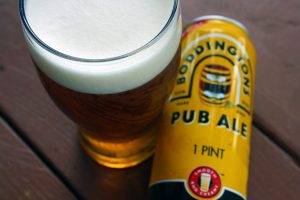
The beer features a picture of a barrel with two bees on it with the name in a horseshoe shape above it and a distinct yellow colour and was one of the first beers in cans that had a widget meant to help and give the beer the creamy top that it was known for (Wikipedia, 2022). The beer itself is a pale ale and has a golden colour with a creamy top and is made with hops, malt, sugar, and water and with an ABV of 4.6%. The brewery is now owned by AB InBev and is produced in Samlesbury, Lancashire.
Origins
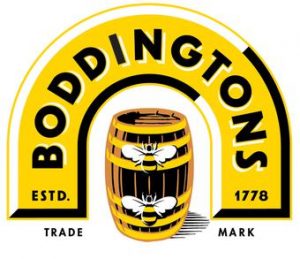
Originally Boddingtons started in a brewery called Strangeways Brewery which was founded by two men in 1778 and the company at the time was called John Harrison & Co. until later when Henry Boddington would join the brewery and then eventually buy the company in 1853 becoming the only owner and the name being changed to Henry Boddington & Co. until later when they became just Boddingtons Breweries Ltd. In 1888 (Wikipedia, 2022). The beer really grew in popularity after the second world war when pale ale became very popular, and sales went up very fast but it wasn’t until 1989 when the new owners Whitbread made it a country wide beer and rapidly increasing the amount produced and distributed.
Milestones
- Bought by Henry Boddington in January 1853 and became Henry Boddington & Co.
- Company bought by Whitbread in 1989
- By 1994 it was 4th highest selling bitter beer in England
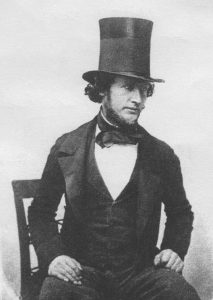
https://brookstonbeerbulletin.com/historic-beer-birthday-henry-boddington/ - In 1992-2000 was the highest selling canned bitter beer
- Officially international in 1993 first coming to Canada
Brewing Science & Industrialization
Boddingtons was basically born from industrialization because of the large amount of growth in population that made a great new market for the locally brewed beer and kickstarted the company to becoming Manchesters beer. Boddingtons went on to create many locations throughout the 1800s and became 1 of 30 companies to produce over 100,000 barrels in one singular year (Boddingtons Breweries 2017 Science+Industry Museum). Boddingtons didn’t become a national beer until it got national distribution that came when the company was bought by Whitbread in 1989 which also drastically increased the companies output of barrels by 400,000 which meant they started to produce a whopping 600,000 barrels. Boddingtons has supposedly stuck to its traditional brewing methods that along with the ingredients helped to give it that famous bitter taste while only improving the brewing equipment even though some people have stated a couple of times throughout history that the taste has changed slightly until finally being discontinued in 2012.
Beer Style
The Boddingtons beer is a pale ale beer that was founded originally in 1778 by two grain merchants who created a brewery. The main beer they are known for is the Boddington Bitter which is known for its bitter taste and creamy top but they also have two more types which are the Boddington Draught Bitter, and the Boddingtons Pub Ale. The company has passed through many owners in its history starting with the two grain merchants
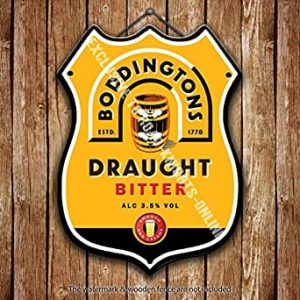
just known for creating it at Strangeways brewery until later on in the mid 1800s when it became a family business for Henry Boddington and officially became Boddingtons which his sons would later take over and pass down the family line until 1989 when bought by Whitbread who expanded the business and then later was bought out by InBev but at the time were known as InterBrew UK until 2012 when it stopped being produced in Manchester.
WWI & WWII Era
Boddingtons was a beer that was created long before either war but this also means if has faced the impact from both those wars. Starting with WWI which caused a great deal of trade fluctuations for the company making the future unpredictable and caused worry for the company. With lots of soldiers and potential customers away fighting in the war it caused the company to decline but never fully done. After WWI the great depression came and that did not help the company either it like WWI caused the company to have trade fluctuations leaving the company vulnerable but like before it was not finished. For WWII not only did customer
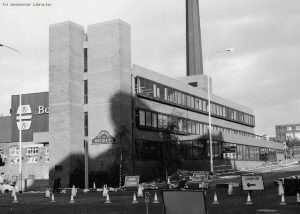
being away for war affect them they were also affected on a much more personal level because in 1940 on December 22 the brewery in Manchester was hit by a bomb during an enemy raid and the brewery was nearly destroyed and they had to shut down for seven whole months to repair the brewery and when the war ended the company used this as an opportunity to better the brewery and make it modern with a new construction plan in place that put in brand new brewing tools and equipment for them to use and get back on track with.
References
Wikimedia Foundation. (2022, February 5). Boddingtons Brewery. Wikipedia. Retrieved February 7, 2022, from https://en.wikipedia.org/wiki/Boddingtons_Brewery
Boddingtons Pub Ale – The Celtic Fringe. (n.d.). Retrieved February 7, 2022, from https://thecelticfringe.com/resources/Boddingtons-fact-sheet.pdf
Boddingtons Breweries. Science and Industry Museum. (n.d.). Retrieved March 13, 2022, from https://www.scienceandindustrymuseum.org.uk/objects-and-stories/boddingtons-breweries
Wikimedia Foundation. (2021, June 30). Boddingtons Bitter. Wikipedia. Retrieved March 14, 2022, from https://en.wikipedia.org/wiki/Boddingtons_Bitter

